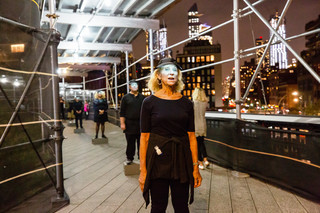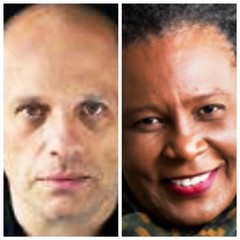|
Back
The Music Above, The Concrete Below New York
High-Line
10/03/2018 - & October 4, 5*, 6, 7, 8, 2018
David Lang: The Mile-Long Opera: A Biography at 7 o’clock
MLO Company Singers, Our Chorus NYC, All City Chorale, Jackson Heights Community Chorus, Harlem Japanese Gospel Choir, The Jalopy Chorus, Huaxia Choir, Mount Sinai Choir, Wadleight High School Choir, Haiyun Chorusl Open Hydrant Theater Company, Edison Chinese Choir, Willow Interfaith Women’s Chorus, Grace Chorale Brooklyn, First Unitarian Congregational Society of Brooklyn, C4 Ensemble, Ukrainian Village of Brooklyn, Astoria Choir, Choral Chameleon, Abrons Arts Center Choir, Coro Hispao de Nueva York, Cerddorion Vocal Ensemble, the Manhattan Choral Ensemble, Inspire: A Choir for unity, Frank A. Haye & The Brooklyn Interdenominational Choir, Downtown Voices, Park Slope Singers, Canta NYC, Vy Higginsen’s Sing Harlem Choir, Frank A. Haye & The Brooklyn Interdenominational Choir, West Village Chorale, R.Evoulción Latina, Songs of Solomon, The Glass Menagerie Chorus, Navatman Music Collective, Huaxia Choir, Peace of Heart Choir, Bobby Lewis New Light Baptist Choir, Os Ensemble, Donald Nally (Music Director)
Elizabeth Diller, Linsey Peisinger (Director), John Torres (Lighting Designer), Jody Elff (Sound Designer), Ragnar Kjartansson (Creative Advisor), Dillo Scofidio & Renfro (Architects, Co-Producers), David Lang, The High Line, THE OFFICE Performing Arts +Film (Co-producers)

(© Liz Ligon)
“Eastward the sea and the sky, and a lengthening evening;/The massive looks of the hills and the serpentine river–/Lamplights in ten thousand homes all around the city/Won’t you come to my river pavilion to escape the heat?...”
Po Chü-yi (772-846)
A devotee of words, an artisan whose musical creations seem to sing themselves, David Lang is no spaced-out composer. This week, though, he changed his tune, so to speak, and tried to conquer space.
With librettists Anne Carson and Claudia Rankine, Mr. Lang has taken over more than a mile of space on New York’s High-Line between 14th Street and 34th Street. The attempt was to transform the urban domain into his own personal plot-less opera. A thousand-odd a capella singers from New York’s endless choral groups moved their heads and eyes and (of course) mouths, as they stood on pedestals, sat on benches, holding coffee cups or candles or computer tablets. The only moving objects were tens of thousands of New Yorkers, standing patiently in line for this Urban Happening.
When it started, surrounded by those “lights in ten-thousand homes”, we strolled, walked, sometimes stopped to hear the words of the poets, rambled on, heard songs coming from the earth (actually, singers on the sidewalk below the High Line) and perambulated (the only appropriate word) onto the next singer or singers, each of them separated by five or ten feet along the elevated lanes.
In one way, this was David Lang’s equivalent of Thornton Wilder’s 90-year-old The Long Christmas Dinner. There, the dramatist tried to conquer time. In a single scene and a single Christmas dinner, nine decades of one family enter and partake, each in the prime of life, each giving way for the next generation.
In The Mile-Long Opera: A Biography at 7 O’Clock, Messrs Lang, Cooper and Rankine, we were the opera, during 90-odd minutes, with words and music supposedly encompassing or embracing our own lives.
Certainly in the words. Nobody had to catch the entire poem. Each sector of the High Line was divided into single poems segueing into other poems. Here was one:
“No we don’t talk but people get to know each other just by walking past each other all the time.”.
As we drifted through the singers, we would hear patches: “But people”, or “Past each other”, or “We don’t talk”...
And like the molecules of a soap bubble, the words glued together or stayed separate. We could stop and listen or go on to the next verbal module. Some of the poems were aphoristic, some of the “essays” were long, drawn out. The speakers here might have a few phrases, leading to the next speaker. Or the speaker might be reciting the complete essay, smiling at us if we smiled, searching for connections from us if we walked on.
For neither the words nor the music were aleatory: they were composed to be sung and spoken with exactitude. We, the walkers, were the aleatory ones.

D. Lang/C. Rankine
(© Courtesy of the Artists)
How did David Lang handle the music? As he always does, with illusionary simplicity, with the misdirection of a magician (“They seem to be singing the same phrase over and over again,” said one walker) and with the practical joints and connections of a shamanistic engineer.
At the start, I tried to infer how each singer was taking different motifs and stringing them into a single line. Yes, the harmonies were the same, yes, the rhythms were subtle counterpoints of the previous singers. Yes, we had a set of medieval canonic tropes, though Mr. Lang had brought them into another century.
After the first poems and chant/song/motif/phrase...er things, I stopped being the musical detective, and just let it happen. And that was hardly difficult, not with a near-thousand solo voices one more beautiful than the other. To be within inches of each singer, hearing the purity of both male and female, young and old, the clarity of their voices, the intimacy of the words, the quiet joy they had in producing them...
Well, only a creepy academician would try to infer what made it work.
But did it actually work? If I had my druthers, the walkers would be eliminated, allowing me to walk in solitary regal splendor amidst the musicians. Those other walkers were suitably attentive (few took pictures, fewer still spoke or whispered). Yet I was evidently amongst multi-thousand other New Yorkers, and I wanted them to simply “melt, thaw and resolve (themselves) into a dew.”
Fat chance!
Instead, I–and thousands of others–accepted what Messrs Lang, Carson, and Rankine had offered us. A pleasant walk in a New York autumn, above the city, below the sky, serenaded by words and tones and mimetic endless phrases.
They did end, and we descended to reality on 34th Street. If Mr. Lang had imagined we would have been carried into another world on the High Line, he had misjudged the distractions of people, traffic, and cement pavements. This was no rainforest of music. It was New York, New York, and–if not a Hawking-style universe next-door–we all had a wonderful time.
Harry Rolnick
|